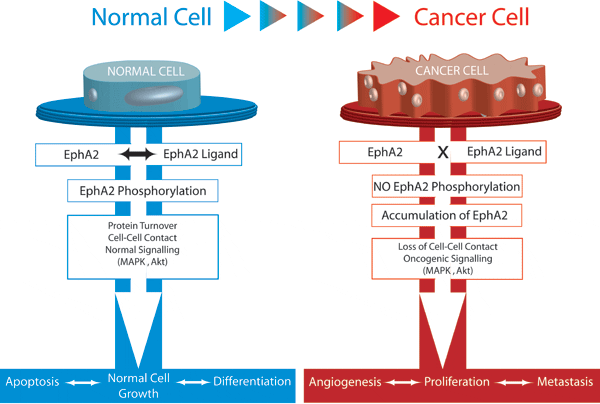Cancer Gene Therapy Research

The EphA2 receptor tyrosine kinase is frequently overexpressed in invasive breast cancer cells. Moreover, these malignant cells have unstable cell-cell contacts, which preclude EphA2 from interacting with its ligand, EphrinA1, which is anchored to the membrane of adjacent cells. This defect is important because ligand binding causes EphA2 to transmit signals that negatively regulate tumor cell growth and survival, whereas the absence of ligand binding favors these same behaviors. Targeting of EphA2 with adenoviral vectors may have therapeutic value.
Publications
Tandon M, Vemula SV, Sharma A, Ahi YS, Mittal S, Bangari DS, and Mittal SK. (2012) EphrinA1-EphA2 interaction-mediated apoptosis and FMS-like tryosine kinase 3 receptor ligand-induced immunotherapy inhibit tumor growth in a breast cancer mouse model. J Gene Med 14(2):77-89.PUBMED
Tandon M, Sharma A, Vemula SV, Bangari DS, and Mittal SK. (2012) Sequential administration of bovine and human adenovirus vectors to overcome vector immunity in an immunocompetent mouse model of breast cancer. Virus Res. 163(1):202-211. PUBMED
Tandon M, Vemula S and Mittal SK. (2011). Emerging strategies for EphA2 receptor targeting for cancer therapeutics. Expert Opin Ther Targets. 15(1):31-51. PUBMED
Sharma A, Tandon M, Bangari DS and Mittal SK. (2009) Adenovirus vector-based strategies for cancer therapy. Current Drug Therapy. 4(2): 117-138. PUBMED
Abraham S, Knapp DW, Cheng L, Snyder PW, Mittal SK, Bangari DS, Kinch M, Wu L, Dhariwal J, and Mohammed SI. (2006). Expression of EphA2 and Ephrin A-1 in carcinoma of the urinary bladder. Clin Cancer Res. 12(2):353-60. PUBMED
Noblitt LW, Bangari DS, Shukla S, Mohammed S, Mittal SK.( 2005). Immunocompetent mouse model of breast cancer for preclinical testing of EphA2-targeted therapy. Cancer Gene Therapy.12.(1):46.-53., 2005.Jan.46-53. PUBMED
Noblitt LW, Bangari DS, Shukla S, Knapp DW, Mohammed S, Kinch MS, Mittal SK. (2004). Decreased tumorigenic potential of EphA2-overexpressing breast cancer cells following treatment with adenoviral vectors that express EphrinA1. Cancer Gene Therapy.11(11):757.-766., 2004.Nov.757-766. PUBMED

